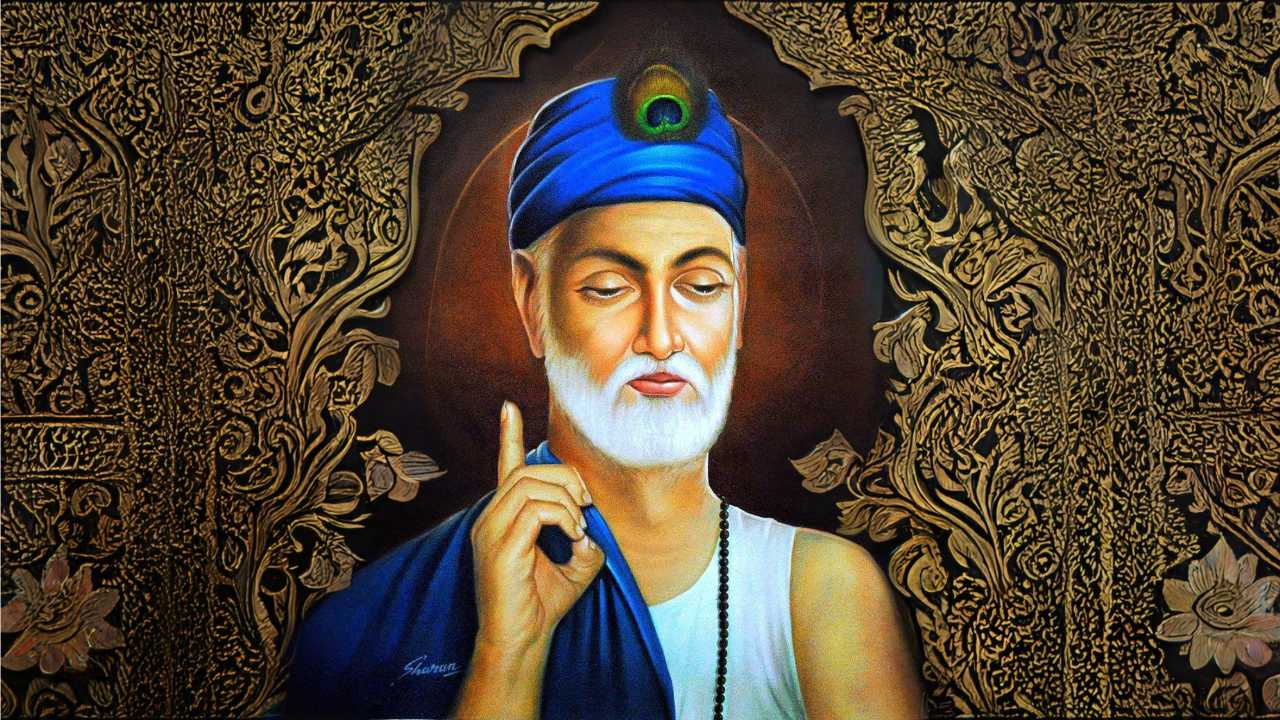
Mystic saint Kabir Sahib’s poetry is widely cherished for its devotional outpourings that kindle the fire in a seeker’s heart. Born over 600 years ago in Kashi (present-day Varanasi), he found himself amidst a society divided by orthodox belief systems and their rituals. Even as a child, his sharp intellect made him question religious norms, longing to know the truth. Only when he met his Guru, Swami Ramanand, did he find the way within, drenching his heart in divine bliss. Revered Master Anandmurti Gurumaa has narrated Kabir’s touching journey.
Kabir’s Inexhaustible Questions
Kabir grew up in a Muslim family. They were not his biological parents – the couple found baby Kabir by a pond and took him home. They were from a low-caste weaver community and were treated poorly. Growing up in Kashi, he was surrounded by two types of people: Muslims and Hindus. One was going to mosques, the other to temples, and both groups despised one another.
Normally, childhood is not the age to introspect or seek for God; it’s an age of playing with toys, eating, sleeping and pooping, that’s it – there is not a fifth thing a child can do. But early on, Kabir had questions. He would ask, “What do you do inside the mosque?” So his father took him to the mosque one day. He saw people performing their rituals in a foreign language, Arabic. He asked, “What does it mean, La Ilaha Illallah?” His poor father, being uneducated, was unable to answer and dismissed the boy.
Seeing his Hindu neighbours wearing a tilak, little Kabir would ask, “What is this dot on your forehead?” “Well, we are Hindus; this is prasad from the temple, a gift from God,” came the reply. He asked what they did in the temple. They told him, “Why should we tell you, you're not a Hindu!” He was shooed away from there as well.
Kabir lived close to the Ganges and observed people taking their daily baths, wondering what the difference between Hindus and Muslims was. Muslims would leave their caps on the shore, and once the Hindus took a dip, their tilak would wash off. Their bodies looked the same! One reads the Quran and is rude, another reads the Ramayana and is rude!
Kabir watched the mullah climb the mosque tower to give the call to prayer. Once, he met him in the bazaar and holding his hand, he asked: “Mullah ji, please tell me: why do you have to go up the tower? Is Allah closer from there? And if He is, can I come along? I would also like to give a call to Allah. And why do you have to call so loudly? Is it for us, the people, or Allah?” The mullah replied that the call was for the people. Kabir said, “There are people who don’t go to the mosque, why do you disturb them at 4 a.m.?” – and he got whacked by the mullah. He came home crying, so his mother embraced the child and asked what had happened. He said, “I just asked questions. What is wrong with that? Why doesn’t anyone reply to them?”
Kabir would ask the Nath yogis, “Why have you torn your ears and put on this earring?” Or question the naga babas, “Why are you naked? Where are your clothes? Why are you wearing ash on your body?” Thus, Kabir roamed about meeting a variety of people.
Somebody suggested that perhaps Swami Ramananda could answer him. He was a big name and had a large following and ashram. But who would permit a Muslim boy to enter a Hindu ashram? He kept on pleading at the gate to be allowed inside, but they refused – “You are a muslim.” This saddened him.
An Unusual Initiation
One day, someone informed him that Swami Ramanand takes a dip in the Ganges in the early mornings. Kabir observed and found that Swamiji was alone at that time. So he made a plan. Long before dawn, he lay on the staircase of the river ghat, waiting with bated breath. “Khat, khat, khat…” – Swami Ramananda’s wooden sandals echoed, announcing the sannyasi’s approach. As Swamiji was walking down the stairs, he stepped on a body. Quickly, he pulled back his foot and inquired, “Who is lying here? Get up, and say Ram!”. Kabir moved and loudly said, “Ram.” Swamiji continued towards the river.
Kabir ran home in sheer joy. He cried out loud, “I have found my Guru, and he has given me a mantra!” Soon, the news spread like wildfire that Swami Ramanand made a muslim boy his disciple. It reached Swamiji, who was puzzled when he had done such a thing. So, Kabir was called for. The boy started dancing – “Not only did I get diksha, my Guru personally calls me! What good luck!”
Entering Disciplehood
Kabir went to the ashram, where a crowd had already gathered. With great delight, he saw the face of his Guru clearly for the first time and bowed down. Swamiji asked, “Dear son, when did I give you initiation?” “Swamiji, this morning.” “But when?” “When you went for your bath. I was the one on whom you placed your foot. You said: ‘Get up, and say Ram.’“ Swamiji laughed and countered, “Do you think this is enough?” Kabir replied, “But Swamiji, is there anything more than Ram you give?” Swami Ramanand was taken aback. He said, “No, there is nothing higher than Ram to give.” He paused, and everyone waited eagerly to hear what Swamiji would say. He resumed, “Okay, if you think that I have given you initiation, and that too in this way, this shows how desperate your heart was to meet me and how meticulously you had planned. At your young age, you spent a sleepless night waiting for me on the staircase… I am honoured to have someone like this as my disciple. I hereby announce that you are my disciple.”
From that day onwards, no one would stop Kabir from entering the ashram. He would always sit in the front, attentively listening as his Guru answered all his questions and dispelled his doubts.
Kabir’s Heartfelt Poetry
Following his time with the Master and imbibing his teachings, the poetry that later flowed from Kabir expressed the celebration in his heart. In his poem Meri ab lagan laagee hai, he says:
1. बंधन काटि किया गुरु मुक्ता, जरा मरण भ्रम भागी है।।
The Guru has cut my bondages and freed me from the illusions of death and old age.
2. जब से दया भई सतगुरु की, लोक लाज कुल त्यागी है।।
Since the day my Satguru cast his mercy on me, the thought “What will people say?” has vanished from my mind.
3. गुरु की दया साधु की संगति, अमर लोक लौ लागी है।।
With the Guru’s grace and the company of sadhus, my heart yearns only for the eternal realm.
4. सुरति-निरति दोऊ भई मतवारी, प्रेम सुधारस पागी है।।
Now, my mind is intoxicated – I have tasted the nectar of divine love!
5. कहैं कबीर सुनो भाई साधो, राम भजे बड़भागी है।।
Says Kabir, O seeker, listen: fortunate indeed are those who meditate on Ram.
Drunk In Love
So, Kabir’s mind is in love. His only thoughts are about love for his Guru, for eternity, for Truth – nothing else is left in the mind.
Have you ever seen drunk people? They are singing songs. Even if they fall into a sewer, they keep singing! A stray dog may be licking their face, but they are happy. If wine can have this effect on people, then what about the ecstatic silence of the mind, the Paramananda! Kabir says, Be intoxicated with meditativeness. Drink the divine wine of love, which is possible only when your mind is silent and not going outward.
The Way of Grace
It is possible that your mind takes that dip into stillness just by being in the presence of the Master. Without doing anything, the mind goes silent, and hours fly by. There is no need to even stretch one’s legs, as the mind goes into another zone altogether. That is the true meaning of having darshan. Darshan does not mean looking at the Guru’s face; it means being in that presence, waiting for the magic to happen.
A scholar may know more of the Vedas than I, but he or she can’t give you that magical moment beyond words. For this reason, there have been events where an illiterate person meets the Guru, falls in love, goes into samadhi and becomes one with the Guru. Whatever the Guru had is transferred into their mind. As you wire money from country to country, gyana can be wired too. This is called heart-to-heart communion of the master and disciple – something amazingly inexplicable and transcendental.
Prominent examples of this divine communion include Shams Tabreez and Rumi, Guru Nanak and Lehna, Kabir and Dharamdas, Rajjab and Charandas Maharaj, or Paltu and his Guru. They saw the Guru, surrendered their mind and became one with the Guru; that’s it. The transformation did not take years, it happened in a moment.
The source of all knowledge is Parabrahman, and a mind in that zone is connected to this divine wisdom. Your mind has the same base of Parabrahman as Kabir’s, Buddha’s or Mahavira’s minds. But with a mind clouded by ignorance, you don’t have access and hence can’t make that divine contact.
Guru Is the Catalyst
Why is a living Guru required? Because only a living Guru can be a catalyst between you and Parabrahman for this reaction to happen. Put together hydrogen and oxygen molecules, but nothing will happen without electricity as the catalyst. In spirituality, the Guru is that catalyst.
That’s what Kabir Sahib is celebrating: “Meri ab lagan laagee hai" – Now I have that love, that passion and surrender. Indeed, a moment of celebration, because not everybody will find it. Swami Ramanand may have had hundreds of disciples, but we remember only Kabir Sahib. Born in the 12th century, we still rejoice in his poetry and songs, drawing great inspiration and motivation to tread the path.







